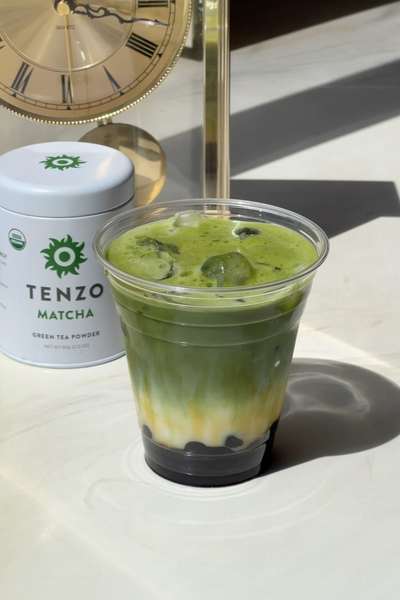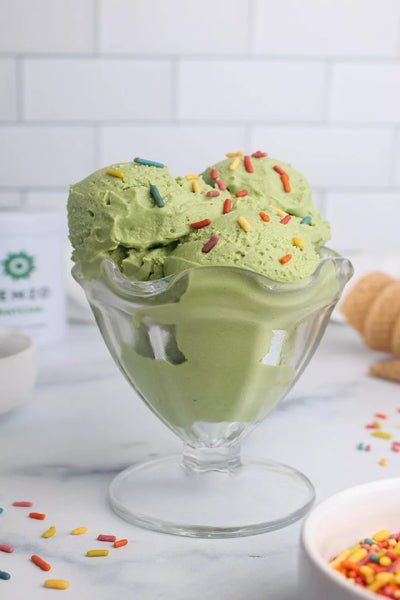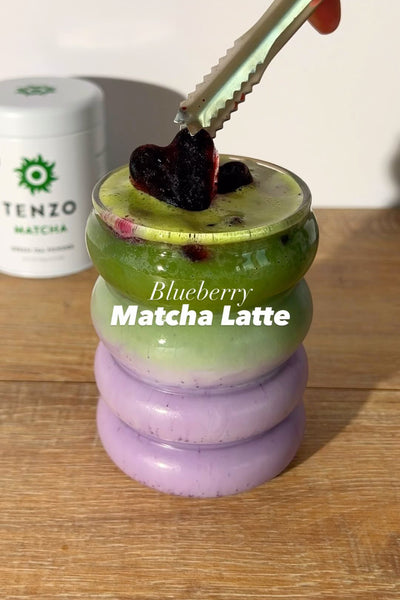Why Does Caffeine Make Me Tired? How to Avoid a Crash

Whether you’re a regular coffee drinker or you occasionally reach for a cup after a long night, you’ve probably experienced the caffeine crash that follows that extra boost of energy—and you’re not alone.
A caffeine crash is one of the most common side effects of caffeinated beverages like coffee and energy drinks, and they can leave you feeling more tired than when you started.
That’s where Tenzo Tea comes in, and our delicious, boosting, and healthy matcha tea, that will give you all the boost you need without any of that frustrating come-down. We also make it easy to find the information and recipes you need to integrate matcha tea into your life, and all the reasons it might be a great option for your energy needs.
Try out your first sip of matcha tea and skip the caffeine crash today.
What is Caffeine?
Caffeine is a naturally occurring stimulant that we often turn to when we need an energy boost. It can be found in coffee and tea plants, as well as synthetic drinks like soda and energy drinks. Caffeine may also be present in food, and there are even supplements for caffeine support.
It’s important to maintain a healthy balance when consuming products with caffeine, however. In small quantities, caffeine can make us feel more energized and focused, so we can start our morning with a smile or accomplish all of our goals for the day.
It has even been shown to help with health conditions and protect the body against future complications when consumed responsibly.
You’ll want to avoid drinking any more than four cups of caffeine in a day, however, and that is often far too much for casual coffee drinkers.
Too much caffeine can lead to spikes in blood pressure, nausea, jitters and insomnia. And another common side effect of excessive caffeine consumption is the caffeine crash that often accompanies the energy.
Why Does Caffeine Make Me Tired?
A caffeine crash is one of the most common side effects of caffeine consumption, where the caffeine in your system begins to wear off and leaves you feeling drowsier than before you had your coffee or tea, but what exactly is a caffeine crash?
Here are a few reasons your morning cup of tea or coffee might be leaving you tired:
It Blocks Your Receptors
Rather than giving you energy, caffeine actually works by blocking the receptors in your body that make you feel tired, but it doesn’t stop the chemicals from being produced.
When the caffeine wears off and you can begin to feel the tiredness again, you’ll also feel the effects of all the chemicals produced while the caffeine was in effect, which is why we often feel more tired than before we started.
You Aren’t Drinking Enough Water
Research is still being conducted on whether caffeine has diuretic properties, which means it causes an increase in urination. That said, we often replace the water we’re supposed to be drinking with coffee or other caffeinated beverages.
When we don’t drink enough water during the day, we can be left with feelings of sleepiness, fatigue, and the inability to focus, which is why it’s important to monitor our beverages and keep a healthy balance.
There Is Added Sugar
It’s not uncommon for caffeinated beverages to have added sugars, which can play a role of their own in causing crashes and sleepiness.
We often don’t realize how much sugar our caffeine drinks contain, so if you notice that you’re crashing more than usual, look at any hidden ingredients in your morning coffee or energy drink.
How To Avoid a Crash
It’s not uncommon to need a little extra energy throughout the day, but how can we get the support we need without the crash?
Here are a few common ways to skip the caffeine come-down while still meeting all your goals and enjoying your day:
Eat Food
While you’re waiting for your caffeine to kick in, make sure you have a bite to eat. When we drink caffeinated beverages on an empty stomach, they digest much more quickly than when they are consumed with food, which means the energy lasts for a shorter amount of time and the crash is more intense.
It’s also important to eat a healthy, balanced meal to get some of the energy we need. Fatigue and sleepiness are common when we don’t have the right balance of vitamins and nutrition in our daily diet. Try to avoid carb heavy foods when you’re looking to wake up, but it’s always better to balance your morning caffeine with food whenever you can.
Drink Water
One of the reasons you may be feeling sleepy and fatigued is simply that you’re not drinking enough water. Proper hydration is key to feeling healthy and refreshed, and we often replace our water intake with caffeinated beverages, sometimes without even realizing it.
If you’re feeling sleepier than usual, pay attention to how much water you drink during the day and make sure there’s a healthy balance with caffeinated beverages.
Spread It Out
It can be tempting to prevent the first caffeine crash of your day by drinking more caffeine, but that just leads to a bigger crash down the line. If you’re a heavy caffeine drinker, you’ll want to space out how often you drink your coffee or tea throughout the day, to reduce the impact of your caffeine crash.
Reduce Caffeine Intake
It can be difficult to reduce the amount of caffeine we consume throughout the day, but lowering our caffeine intake can help with caffeine crashes and make it easier for us to stay awake and focused.
You don’t want to quit caffeine all at once, since that can lead to headaches and those same caffeine crashes you’re trying to avoid. Instead, adjust your intake with lower levels of caffeine and fewer caffeinated drinks throughout the day.
Don’t Drink Late
When we drink caffeine late in the day, it can make it difficult to fall asleep and get the rest that we need to feel refreshed and ready to meet our goals.
That can mean more caffeine and a higher possibility of caffeine crashes. The very best thing we can do to avoid caffeine crashes is get enough sleep, so you’ll want to try to steer clear of anything that might affect your rest.
Switch to Matcha
There’s no better option for your caffeine needs than matcha tea, like the kind available here at Tenzo Tea.
Matcha tea is a healthy and delicious alternative to other caffeinated beverages, and it has a much slower and more lasting impact on the body. That means you’ll get to enjoy the effects of caffeine and focus support for a longer period of time, and you won’t have to worry about the crash at the end, since matcha is gentler, without being any lower impact.
Unlike traditional teas, matcha is mixed into the hot water, rather than steeped, which means it delivers more caffeine and a stronger, more bold flavor. In fact, there are many different ways to add matcha to your diet, including lattes, ice cream, brownies, and more.
Matcha has also been proven to support other physical and mental health benefits, like improved focus, oral hygiene, and immunity boosting, all without the crash.
Conclusion
Caffeine doesn’t have to come with a crash. There are many benefits to maintaining some caffeine in your daily diet, but you shouldn’t have to worry about falling asleep once the effects wear off.
You can reduce the impact of the caffeine crash by eating and drinking enough, getting enough rest, spreading out your caffeinated beverages throughout the day and switching to matcha tea.
When you’re ready to begin trying out matcha tea for yourself, Tenzo Tea is here to help. We believe everyone deserves access to bold and delicious flavors that deliver on powerful energy boosting support, and matcha tea is the perfect option.
Matcha tea has a long and exciting history that dates back centuries, and is often associated with a wide range of health benefits. Matcha is made by blending tea with hot water, rather than steeping it, so the bold flavors from young tea leaves really show through.
It’s easy to begin making matcha tea recipes, from lattes to smoothies, at home, and it mixes well with many of your favorite ingredients.
For flavors that deliver and energy that supports without the crash, try our matcha tea from Tenzo Tea today.
Sources:
Caffeine Q & A | University Health Service
Dehydration - Symptoms and causes | Mayo Clinic
Caffeine: How Long it Lasts, How Much & Withdrawals | Cleveland Clinic.










